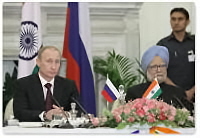New agreements between Russia and India cover cooperation in nuclear power and a roadmap for this year's work by the two countries. Meanwhile, the Indian government has deferred a bill that could be vital to opening nuclear trade with the USA.
 |
| PMs Putin and Singh look on as the agreements are signed (Image: Prime Minister's Office) |
The speeches made by both leaders announcing the new agreements praised their countries' close ties but were light on detail. Kiryenko revealed more about the content of the agreements in later remarks covered in the Indian and Russian media and cited on Rosatom's web site. According to those reports, the roadmap agreement provides for the construction of the fifth and sixth units at the Kundankulam site in Tamil Nadu, as well as outlining a construction plan for the third and fourth units at the site. Also included is the construction of two Russian-designed reactors at Haripur in West Bengal. Kudankulam 5 and 6 and the two Haripur units would be built over the period 2012-2017.
Kudankulam is already home to two Russian-designed reactors in advanced stages of construction, with the first unit expected to start up later this year and the second to follow in 2011.
According to Kiryenko, the possibility of building a Russian-designed nuclear fuel fabrication facility in India is under consideration under the cooperation agreement, which is also reported to provide for the reprocessing of spent fuel in India, under international safeguards.
India has developed a flourishing nuclear energy sector despite being largely excluded from international trade in nuclear plant or materials for over three decades because of its status outside the international Nuclear Non-Proliferation Treaty. However, that changed in late 2008 when the international Nuclear Suppliers Group decided to allow the country to participate in the trade of nuclear energy-related materials and equipment. Since then, India has signed or is working towards civil cooperation agreements with a list of countries including the USA, Russia, France, the UK and Canada, as well as Argentina, Kazakhstan, Mongolia and Namibia. Prominent amongst these would-be cooperators is Russia, already building the first two VVER pressurized water reactors at Kudankulam under a special agreement already in place before the opening of international trade.
Liability bill deferred
Meanwhile, the Indian government has deferred the introduction of a bill on nuclear liability that has been described as an essential step towards nuclear trade with the USA. The bill, which would have set limits on the amount of liability to be paid by nuclear operators in the event of a nuclear power plant accident, was due to be introduced to the Indian parliament, the Lok Sabah, today (15 March) but was withdrawn at the beginning of the day's business. The contents of the bill have been widely criticised by opposition parties in the Indian government.
Although nuclear trade between the USA and India became possible under agreements signed in 2008, no commercial contracts for reactors have yet been completed in part because of India's current lack of an appropriate nuclear liability law.
Researched and written
by World Nuclear News






_15863.jpg)







